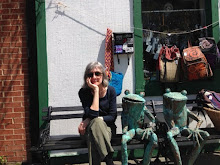Imagine if most of the Jews who fled Germany – plus those
who survived the Holocaust – returned to Germany after the war, created a new
form of participatory government which outlawed discrimination, prosecuted
almost a million genocide perpetrators through local community courts,
encouraged the lower-level perpetrators to apologize and serve time building
houses and roads, elevated the status of women to the point that over 50% of
the members of parliament were women, and embarked upon an ambitious
reconciliation and healing campaign at every level of German society.
Can’t imagine it? Neither can I. But in Rwanda, the
unimaginable is a reality.
This February, on the eve of Rwanda’s commemoration of the
20th anniversary of the Tutsi genocide, I joined a 10-day “witnessing”
tour hosted by the Karuna Center for
Peacebuilding, based in Amherst. Each day
our small group of Americans met Rwandan people with powerful stories to tell.
We met physicians and subsistence farmers, members of parliament and radio
personalities, dreamers and pragmatists. We heard stories of horror, and
stories of heroism, rescue, reconciliation and – unimaginably, miraculously –
stories of forgiveness.
To say that Rwanda has experienced a resurrection is not
hyperbole. Twenty years ago, this beautiful little country was dead.
Physically, spiritually, economically, politically dead. Visitors today see
signs of transformation everywhere. Physical, spiritual, economic, and
political transformation. Yet to travel through Rwanda now is to experience a
kind of moral vertigo – How can it be that these stories of transformation are
real, given the horrors of the recent past? Is what we are witnessing just a
thin veneer masking the conflict still rumbling just below the surface?
For me, as a Jew accustomed to living with paradox, the
answer is: yes and yes. Yes the transformation happening is real, and yes conflict
and evil are still lurking. Yes there are inspirational stories of trauma
healing and forgiveness, and yes there are still heart-sick survivors and
unrepentant perpetrators. The reality that Rwanda still faces huge challenges does
not take away from the reality that the country has experienced an
awe-inspiring resurrection. The reality that Rwanda’s political transformation
has a dark side does not take away from the reality that one by one, the
Rwandan people are transforming their culture. It is a transformation worth
watching, and learning from. If Tutsi survivors can live as neighbors,
co-workers, and even friends with Hutu perpetrators and bystanders, then
anything is possible. Theirs is a message of hope.
